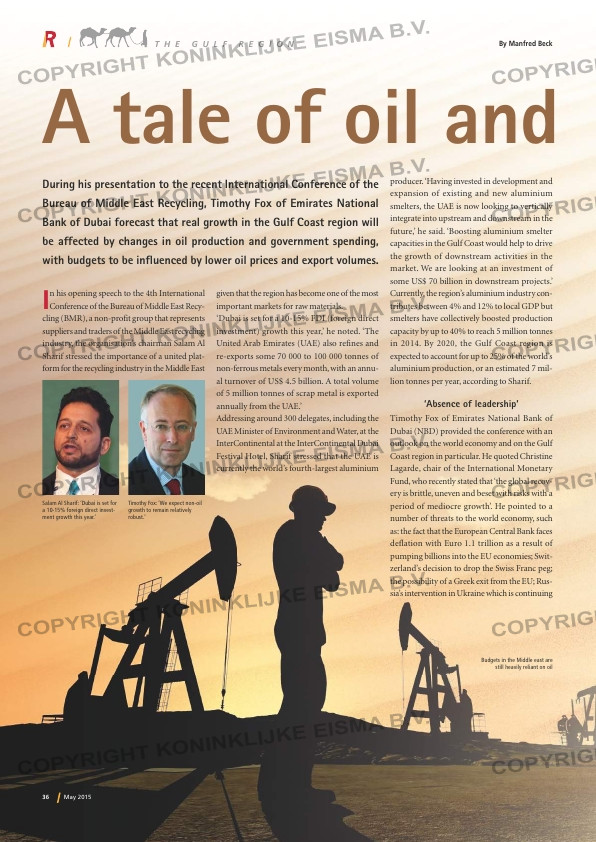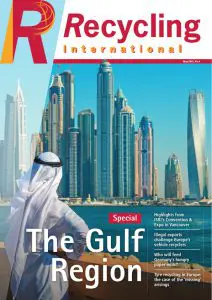Page 36 from: May 2015

During his presentation to the recent International Conference of the
Bureau of Middle East Recycling, Timothy Fox of Emirates National
Bank of Dubai forecast that real growth in the Gulf Coast region will
be affected by changes in oil production and government spending,
with budgets to be influenced by lower oil prices and export volumes.
In his opening speech to the 4th International Conference of the Bureau of Middle East Recy-
cling (BMR), a non-profit group that represents
suppliers and traders of the Middle East recycling
industry, the organisation’s chairman Salam Al
Sharif stressed the importance of a united plat-
form for the recycling industry in the Middle East
given that the region has become one of the most
important markets for raw materials.
‘Dubai is set for a 10-15% FDI (foreign direct
investment) growth this year,’ he noted. ‘The
United Arab Emirates (UAE) also refines and
re-exports some 70 000 to 100 000 tonnes of
non-ferrous metals every month, with an annu-
al turnover of US$ 4.5 billion. A total volume
of 5 million tonnes of scrap metal is exported
annually from the UAE.’
Addressing around 300 delegates, including the
UAE Minister of Environment and Water, at the
InterContinental at the InterContinental Dubai
Festival Hotel, Sharif stressed that the UAE is
currently the world’s fourth-largest aluminium
producer. ‘Having invested in development and
expansion of existing and new aluminium
smelters, the UAE is now looking to vertically
integrate into upstream and downstream in the
future,’ he said. ‘Boosting aluminium smelter
capacities in the Gulf Coast would help to drive
the growth of downstream activities in the
market. We are looking at an investment of
some US$ 70 billion in downstream projects.’
Currently, the region’s aluminium industry con-
tributes between 4% and 12% to local GDP but
smelters have collectively boosted production
capacity by up to 40% to reach 5 million tonnes
in 2014. By 2020, the Gulf Coast region is
expected to account for up to 25% of the world’s
aluminium production, or an estimated 7 mil-
lion tonnes per year, according to Sharif.
‘Absence of leadership’
Timothy Fox of Emirates National Bank of
Dubai (NBD) provided the conference with an
outlook on the world economy and on the Gulf
Coast region in particular. He quoted Christine
Lagarde, chair of the International Monetary
Fund, who recently stated that ‘the global recov-
ery is brittle, uneven and beset with risks with a
period of mediocre growth’. He pointed to a
number of threats to the world economy, such
as: the fact that the European Central Bank faces
deflation with Euro 1.1 trillion as a result of
pumping billions into the EU economies; Swit-
zerland’s decision to drop the Swiss Franc peg;
the possibility of a Greek exit from the EU; Rus-
sia’s intervention in Ukraine which is continuing
T H E G U L F R E G I O N By Manfred Beck
Timothy Fox: ‘We expect non-oil
growth to remain relatively
robust.’
Salam Al Sharif: ‘Dubai is set for
a 10-15% foreign direct invest-
ment growth this year.’
Budgets in the Middle east are
still heavily reliant on oil
A tale of oil and opportunity
36 May 2015
RI 4-ME_BMR Conference.indd 36 04-05-15 09:20



